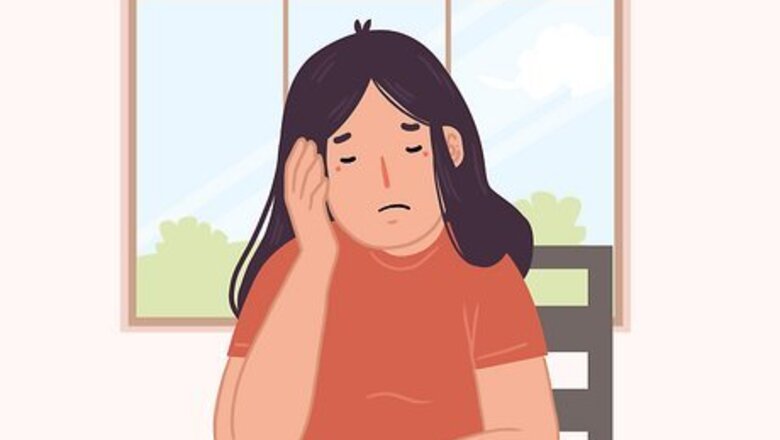
views
Coping with Emotional Pain
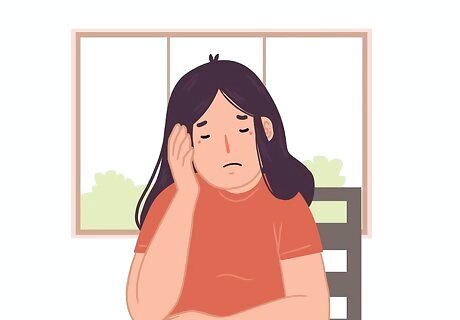
Allow yourself to feel bad. Emotion-focused coping is important to dealing with a breakup. This means allowing yourself to feel grief, sadness, and anger. These are normal and natural emotions that are felt after a relationship ends. Give yourself the time to grieve and recover, at your pace. Take care of your own emotional needs. If you want to stay at home and cry in your bed, do so. One way to accept your emotions is to tell yourself, "It is okay for me to feel bad right now. I'm going through a difficult time." Getting in touch with your emotions and tolerating distress is about accepting the emotion without judging it or necessarily trying to change it. Sit with the emotion and observe how it feels. What do you feel in your body? This information can indicate how you are feeling and help you process your feelings in a healthy way. Reader Poll: We asked 291 wikiHow readers who’ve been through a breakup, and 75% of them agreed the best way to move on is by giving yourself time to grieve. [Take Poll]

Talk about it. Your overall perception of social support can help you throughout the process of healing from a breakup. Processing your feelings out loud with trusted individuals can help with emotional healing; not to mention the support you’ll feel from others that care about you. It is important to acknowledge that you’re hurting; bottling it up may result in a melt-down later. Ask a friend to come over and support you during this time. You could stay in your pajamas and watch a movie. Use this time to connect with your friend and discuss your feelings regarding the breakup. Go out for coffee or bite to eat with a family member.

Let your friends take care of you immediately after the breakup. A lot of times, your friends will want to keep you busy and help you feel better. Let them if you feel up to it. Distraction is a great way to temporarily feel better after a breakup. Additionally, your need for intimacy may be stronger after a breakup.
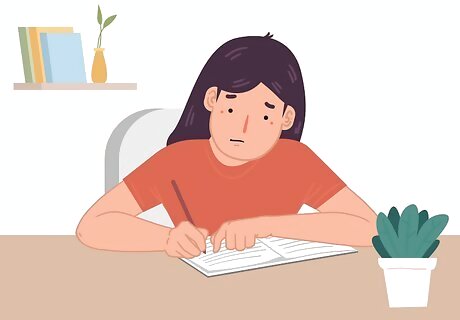
Write about it. Creative and expressive writing is a very useful tool in processing emotions and thoughts related to a breakup. Write down your thoughts and feelings about the breakup on a Word document or journal. Avoid status updates, blogs, or other online posts because these can leave you feeling exposed. You could write a letter to your ex that you never send. Tell him how you feel. Let your anger out. You don’t have to worry about his reaction if you don’t send the letter. Taylor Swift Taylor Swift, Singer & Businesswoman Songwriting can be a useful coping mechanism. "I've never thought about songwriting as a weapon. I've only thought about it as a way to help me get through love and loss and sadness and loneliness and growing up."
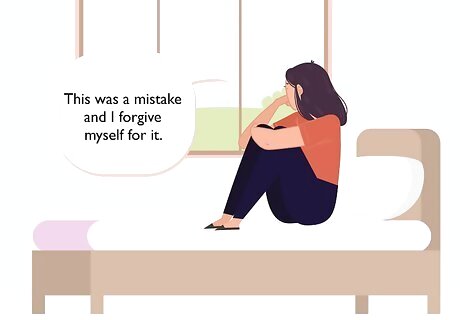
Don't blame yourself. Individuals that blame themselves for a breakup may end up experiencing distress, anxiety, depression and reduced health outcomes. Individuals who do not blame themselves are able to process their emotions better and look at negative events from the past more realistically. Instead of blaming yourself or thinking negatively, forgive yourself for any mistakes or transgressions First analyze what you think you might have done wrong. You could write these down if you wish. Then, go through each item and say or think to yourself, "This was a mistake and I forgive myself for it. I did not want it to turn out this way and I know what I did was wrong. I will work toward not continuing to make this mistake in the future."

Distract yourself. Sometimes when people split up they make ruminate over the relationship, thinking, “What could I have done better? Am I not good enough?” However, this may lead to more distress and less emotional adjustment. Avoid re-playing the situation in your mind over and over again, and thinking about what you could have done to fix the situation. If you find yourself doing this, distract yourself with an activity or think about something else. You can also remind yourself that you may not have been able to do anything, and you could not have predicted the outcome. Avoid social media such as Facebook. It can be difficult to avoid cyber-stalking your ex and will social media will not serve as a useful distraction if it constantly reminds you of your ended relationship. One study showed that people who looked at their exes on Facebook had higher distress and longer for their ex-partner. Be busy and pack your social calendar full with activities and events. Try new things and rekindle old friendships.
Paying Attention to Personal Growth

Focus on yourself. New relationships can cause you to expand your sense of self because you adapt to another person. However, after a breakup it can be difficult to regain your unique identity and make sense of your daily activities. So, work on redefining yourself and celebrate your individuality and uniqueness. Some people can get a sense of freedom after a relationship ends, use this feeling to your advantage and explore new activities. Explore activities that you previously liked but were too busy to engage in. Get a new haircut or style.

Identify the positive consequences. Many people find that breakups, while hurtful and difficult, produce positive results in the end. Identifying some of the positives outcomes of the breakup may help you feel less sad or angry. For example perhaps the breakup helped you focus more on school, work, or other obligations. Some people feel that breakups allow them to have more freedom. You may also have personal positive outcomes from the breakup such as more confidence, self-reliance, and self-acceptance. In addition to environmental and personal outcomes, you might also have gained more communication skills throughout the relationship and learned valuable relationship skills (i.e. learning to admit when you’re wrong).

Learn from your mistakes. Some breakups occur due to lack of satisfaction within the relationship, inadequate personal investment, or perception of alternatives (“there’s plenty of fish in the sea” mentality. People are more likely to break up if they have a strong social support system outside of the relationship. For example, individuals may be more likely to breakup if they are unsatisfied or not respected. Attempt to identify things that you could have done better, but don’t beat yourself up. View the relationship as a growing opportunity that will help you navigate future relationships. Try to reflect (think logically) instead of ruminate (getting caught up in negative thinking).
Dealing with Your Ex Healthfully

Decide if you want to be friends. Individuals who are friends before a relationship are more likely to remain friends after a breakup. You will be less likely to remain friends if you completely withdraw from the person after the breakup. However, you may need this time to get space and be alone.

Get space. Though you may wish to stay friends, you may have an easier time getting over your ex if you don’t see and talk to him. For now, it can be helpful to remove him from your Facebook friend list, delete his number from your phone, and avoid hanging out with him. If your ex wants to stay friends, let him know that you’re going to need time and that you’ll contact him when you’re ready.

Get rid of things that remind you of your ex. It may be easier to get space to grieve if you are not reminded of your ex by everything around you. Letting go of the physical and digital may help you let go emotionally too. For example, if he left a toothbrush at your place, throw it out. Seeing it every morning could trigger negative feelings for you and color your day. If there is something that shouldn’t be thrown away or given to charity, give it to a mutual friend to give back. Delete or toss away the photos if you wish. If you want, you can save the photos of yourself using Photoshop or some other editing program to carve out your image without your partner. Delete your ex's number from your phone. If you need his number, delete every message or voicemail from him––a clean slate!

Be polite and brief if you bump into each other again. It only hurts you to turn the breakup into an ongoing fight. If it is too painful to address your ex at this point, try to exit the situation so that you can avoid talking to him. Setting boundaries is an important component of the healing process. If you don’t want to talk to him, you don’t have to. If you do decide to speak to him, acknowledge him politely and smile. Be respectful. Aggressive speech such as saying, “I hate you!” or behaviors, such as throwing objects at your ex, do not solve problems.
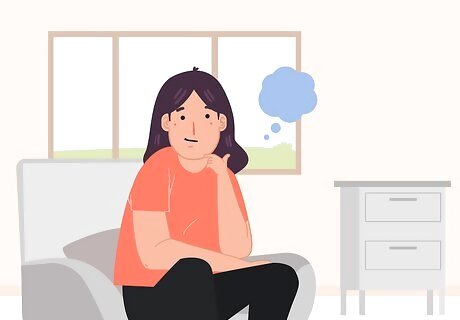
Hold on to your good memories. Just because the relationship has ended doesn’t mean you have to erase it from your life. It is likely that the person you had a relationship with had a big impact on you and your life, and you can cherish those changes. This is especially helpful if you have a lot of anger and resentment toward your ex. Focusing on the positive may be able to assist you in positively coping and gaining closure from the relationship. Forgive your ex for his mistakes. Harboring resentment only makes you feel worse and stunts the healing process. You don’t have to tell him face-to-face or even on the phone, you can forgive him in your heart and this is just as effective. Avoid ruminating over the happy times. This can lead to longing and prolong your grief process.


















Comments
0 comment